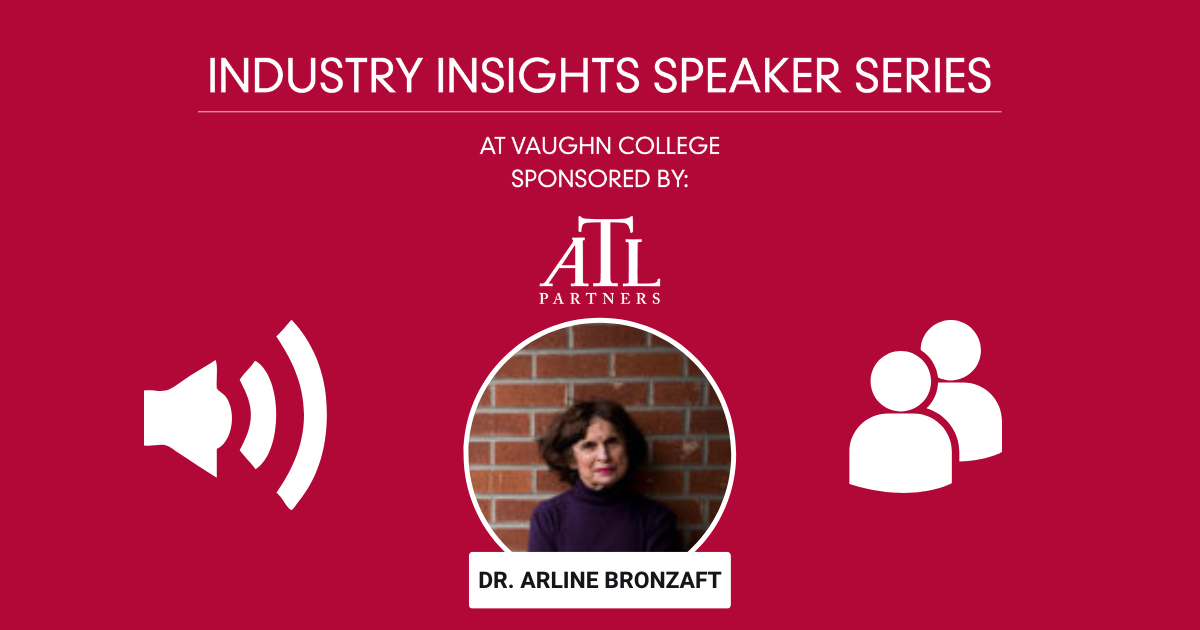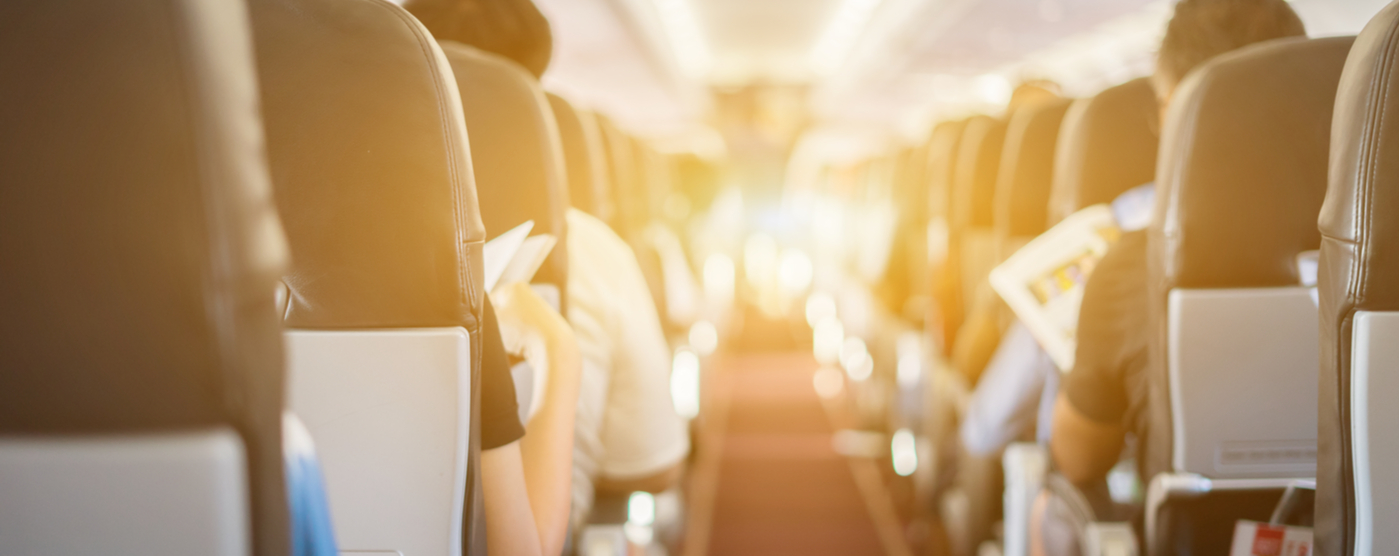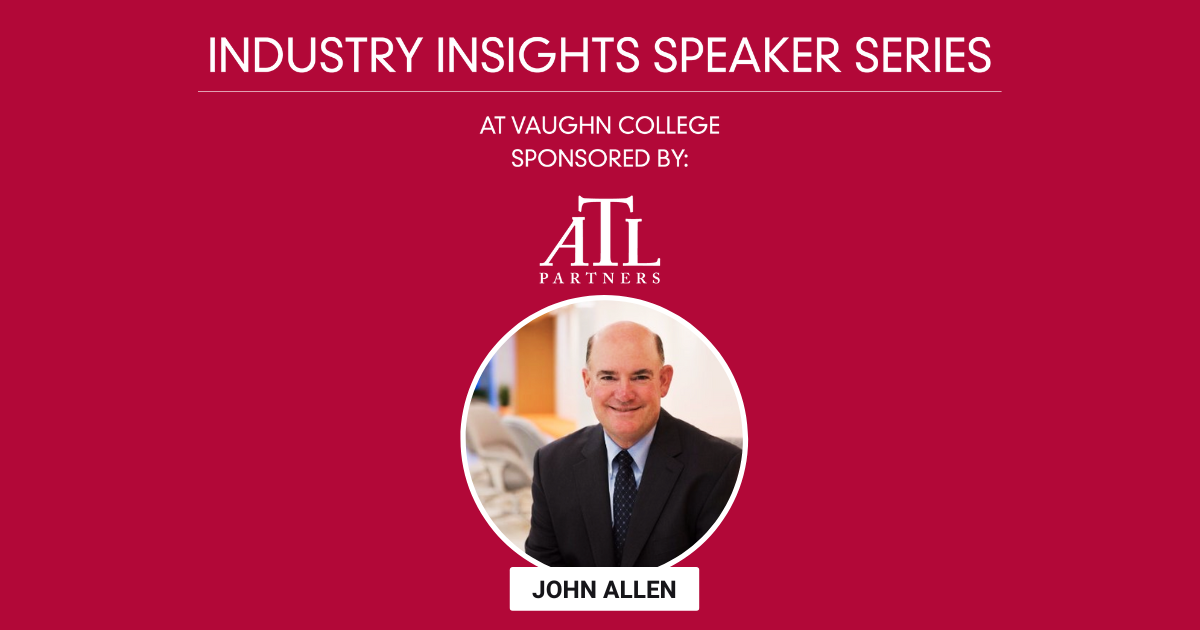Industry Insights Speaker Series: Dr. Arline Bronzaft Discusses the Effects of Noise on Society

The management department at Vaughn College welcomed Dr. Arline Bronzaft, environmental psychologist, author, researcher and renowned expert on noise to its Industry Insights Speaker Series, sponsored by ATL Partners. Hosted by Dr. Maxine Lubner and Adjunct Professor Loretta Alkalay, Dr. Bronzaft discussed her lifetime of experience in the study of the effects of noise on mental and physical health and learning.
About Arline L. Bronzaft, PhD
For more than 50 years, Bronzaft has been an exemplary leader in bringing awareness to the effects that noise has on learning and society. She is an environmental psychologist, researcher, consultant and author whose collaborative work with numerous agencies has led to landmark changes, such as the 2007 revision of the New York City noise code and the implementation of a noise education curriculum in the New York City public school system—to name just two. Her passion and dedication to this cause led her to research the impacts of transit noise on classroom learning and airport-related noise and how each affects residents who live near transportation vicinities.
Bronzaft holds the title of Professor Emerita from City University of New York. She co-authored “Why Noise Matters” and wrote “Listen to the Raindrops”—a book which teaches children about the dangers of noise. Bronzaft has been appointed by five New York City mayors as the chairperson of the Noise Committee of GrowNYC.org. Additionally, she received the American Psychological Association Citizen Psychologist Presidential Citation. She is a founding member of The Quiet Coalition, a group of professionals in the science, health and legal arenas whose aim is to give one voice to the growing public health problem of environmental noise.
How her career began
Bronzaft first became interested in sound and noise research after studying the impacts of subway noise on student learning. In one instance, a subway would pass by a school every four minutes, but only half the number of students would hear it. Bronzaft’s study revealed that children who were exposed to the train noise were a year behind in reading skills when compared to students on the quieter side of the school. Additionally, Bronzaft conducted research on the health and well-being of New York residents who had been impacted by the noise of aircraft. So, what exactly is noise? Let’s find out.
What—exactly—is noise?
Bronzaft explained that before defining what noise exactly is, there must be an understanding of the concept of sound. She described sound as a physical phenomenon of vibrations that travel through the air—or water—and are then detected by our ears. Then, the brain analyzes these vibrations to help us determine what they are (i.e., the sound). The frontal lobe of our brain is what tells us if it’s welcoming and pleasant—or not.
Noise, on the other hand, is just that: noise. It is measured by its volume to determine whether it is welcoming or not. For the most part, noise is nothing more than unpleasant or unwanted sound.
Did you know that noise is among the most widespread occupational health issues that we experience today? Bronzaft outlined the effects of noise on our health in ways that we might never have imagined.
Effects of noise on our health
Have you ever been bothered by a particular sound, such as a dripping faucet or a high-pitched voice? Bronzaft explains how the way we react to a particular sound has physiological effects on our bodies that are intrusive, thus making it difficult to learn or complete a task. “Noise is harmful to our health and can cause physiological damage,” Bronzaft said.
Here are some of the startling ways in which noise can affect our health:
- Cause stress—The way our bodies react to noise can cause an increase in heart rate and blood pressure, which may lead to physiological damage.
- Increase aggression and incite harmful behavior—Noise can cause aggression, anger and dangerous, harmful behavior.
Interesting Fact: The effects of noise date back to the Roman Era, when horses walked on cobblestone streets. Fast forward to 1776, when our founding fathers asked for dirt to be placed on the cobblestone streets to help reduce the noise while they drafted the Declaration of Independence.
How to cope with noise
There’s no denying that we live in a noisy society. Bronzaft’s lifelong commitment to building a quieter society has uncovered some interesting outcomes, such as “learned helplessness.” A good example of this would be living on the bottom floor of an apartment building with noisy neighbors above you. Aside from moving out, those who live downstairs feel helpless in their situation, which increases their stress levels. “Our bodies use extra energy to sustain itself in situations like these,” said Bronzaft. “Getting used to a situation is not the answer. In fact, it’s just the opposite and will have adverse effects on the well-being of your body.”
There are many ways to address a situation like this calmly and pointedly. You can speak with the landlord or speak directly with the noisy neighbor to work out a reasonable agreement.
How the pandemic opened our eyes—and ears—to sound
Interestingly, the pandemic has resulted in a reduction of noise that has created a quieter society. “People began realizing the sounds of nature,” Bronzaft said. “Without airplane and other intrusive noises, we became more aware of birds singing, dolphins and whales surfacing and other amazing sounds of nature.”
How Vaughn has addressed noise on campus
Vaughn’s close proximity to LaGuardia Airport has raised questions about airplane noise and its effect on student well-being and learning. Dr. Lubner weighed in on the steps which Vaughn took to soundproof the buildings on the College’s campus. In a collaborative effort, the Federal Aviation Administration (FAA) and the Port Authority of New York and New Jersey funded a $23 million renovation to soundproof the academic buildings, along with the residence halls, in an effort to shield students and faculty from airplane noise. “We have learned very important lessons through studies and science on the negative effects of noise on learning,” said Dr. Lubner. “It’s important to address these issues from the very beginning through discussion and design. It is then we can help to prevent and mitigate these issues.”
Vaughn’s aviation and management programs
Vaughn offers a range of master’s, bachelor’s, associate and certificate programs in aviation, management and aviation maintenance. As a leading institution in these industries, the College is setting the pace for providing its students with the skills they need to land jobs in these in-demand fields. Are you ready to pursue your futureproof career? Discover the possibilities of a lifelong career through one of our programs. Apply today!

